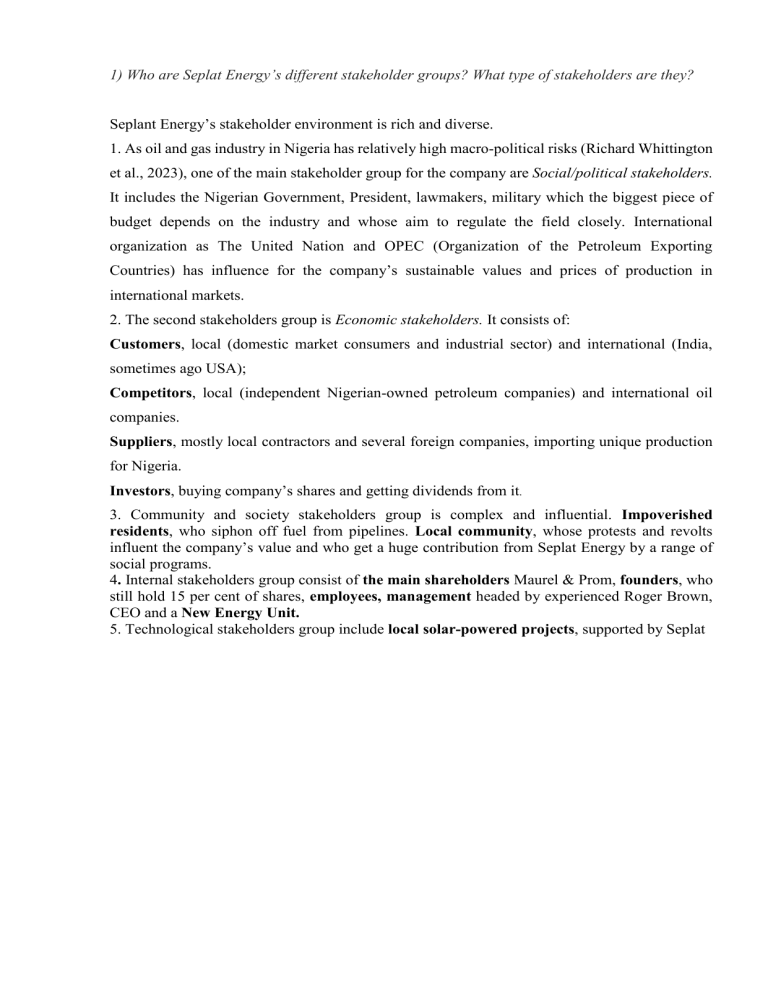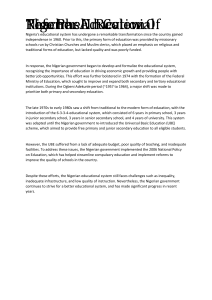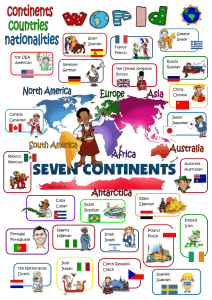
1) Who are Seplat Energy’s different stakeholder groups? What type of stakeholders are they? Seplant Energy’s stakeholder environment is rich and diverse. 1. As oil and gas industry in Nigeria has relatively high macro-political risks (Richard Whittington et al., 2023), one of the main stakeholder group for the company are Social/political stakeholders. It includes the Nigerian Government, President, lawmakers, military which the biggest piece of budget depends on the industry and whose aim to regulate the field closely. International organization as The United Nation and OPEC (Organization of the Petroleum Exporting Countries) has influence for the company’s sustainable values and prices of production in international markets. 2. The second stakeholders group is Economic stakeholders. It consists of: Customers, local (domestic market consumers and industrial sector) and international (India, sometimes ago USA); Competitors, local (independent Nigerian-owned petroleum companies) and international oil companies. Suppliers, mostly local contractors and several foreign companies, importing unique production for Nigeria. Investors, buying company’s shares and getting dividends from it. 3. Community and society stakeholders group is complex and influential. Impoverished residents, who siphon off fuel from pipelines. Local community, whose protests and revolts influent the company’s value and who get a huge contribution from Seplat Energy by a range of social programs. 4. Internal stakeholders group consist of the main shareholders Maurel & Prom, founders, who still hold 15 per cent of shares, employees, management headed by experienced Roger Brown, CEO and a New Energy Unit. 5. Technological stakeholders group include local solar-powered projects, supported by Seplat 2) What stakeholder group(s) exhibit power and attention regarding Seplat Energy? Key Players As the company’s website says, Seplat Energy’s mission is “Leading Nigeria’s transition with accessible, affordable and reliable energy that drives social and economic prosperity” and taking in account that Nigeria’s population is young and fast growing (Mansson et al., n.d.) we can imply that the most powerful stakeholders, considered by the company, are Nigerian Government, the local consumers, increasing constantly in amount and suffering from a lack of power supply domestic and foreign customers and domestic and international customers. The Nigerian Government with the President and Ministers have a lot of power and attention for all the industry because the Government’s budget depends on its revenue a lot. The Government also directs the way of evolution of the industry by taxes and regulation acts, for example, it stated a gas as the main fuel for power generation petrol for domestic markets (Mansson et al., n.d.). The most powerful and paying more attention stakeholder should be the biggest shareholder, Maurel & Prom, French oil company and Board of Directors as a hole. The group of stakeholders above can be called Key Players (Fig. 1) and they must be actively cultivated. Gadflies Local activists are interested in Seplat’s Energy influence on the environment and social life, they also may protest for a better benefit from the society but they are not the most powerful and influential stakeholders in such country as Nigeria is. Competitors, as a part of Economic stakeholders group, do not have much power. For international companies it is not easy to compete because of low producing costs of Seplat’s oil. Seplat Energy has a powerfull position on the domestic market due to its ambitious project, Oben gas processing hub, located in the important oil production Nigerian region, the Delta region. Domestic suppliers pay a lot of attention to the company monitoring its needs and tenders, but due to high level of rivalry in the field they are rather weak. Sleeping Giants Foreign suppliers on the other hand are strong if they offer unique goods for Nigerian market, but they pay less attention to organization, considering that their sales have international scale. We can consider international organizations (OPEC, UN) as Sleeping Giants stakeholders group. It means that potentially them both don’t constantly analyzing and scanning the company’s condition but they are able to bring a lot of changes in the industry or in the company’s resources and capabilities. Withdrawing the membership or canceling a license could one of the outputs of reduced attention to that stakeholders group. Also customers and consumers have a lot of power as usual because they are the main revenue makers for the company, but it does not matter for customers how the company operates, its structure and conditions, they do not pay a lot of attention for it. Irrevelants Local solar projects, supported by Seplat Energy, do not have power and do not pay a lot of attention to the organization activity. Refferences: Mansson, C. V., Whittington, R., & Oteh, A. (n.d.). Seplat Energy: Leading Nigeria’s energy transition in a multistakeholder environment. Richard Whittington, Patrick Regnér, Duncan Angwin, Gerry Johnson, & Kevan Scholes. (2023). Exploring Strategy (Text and Cases), 13th edition (13th edition). Pearson. Attention Fig. 1 Domestic supplier Local activists, Protestors GADFLIES Competitors Maurel & Prom Founders KEY PLAYERS Nigerian Government Foreign supplier Customers IRREVELANTS SLEEPPING GIANTS Local solar projects The United Nations, OPEC Power



